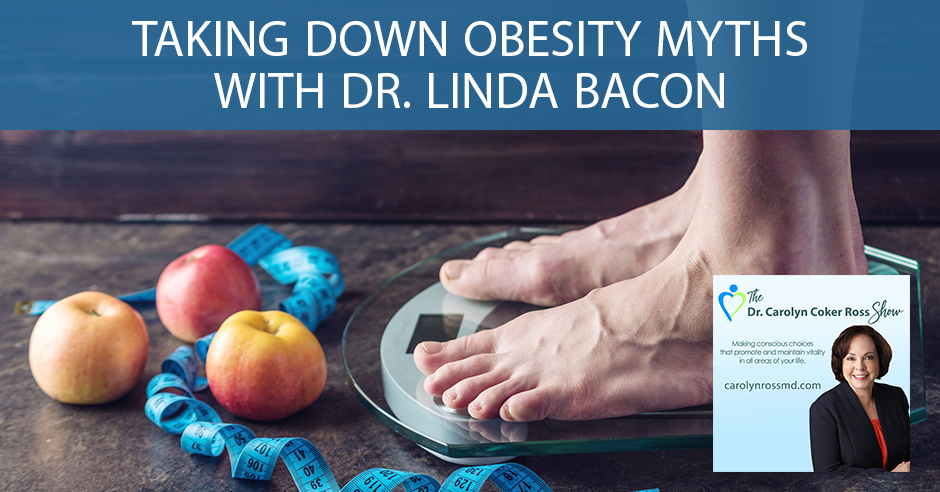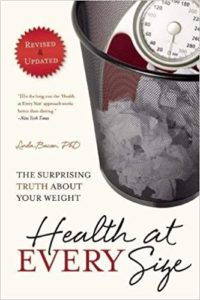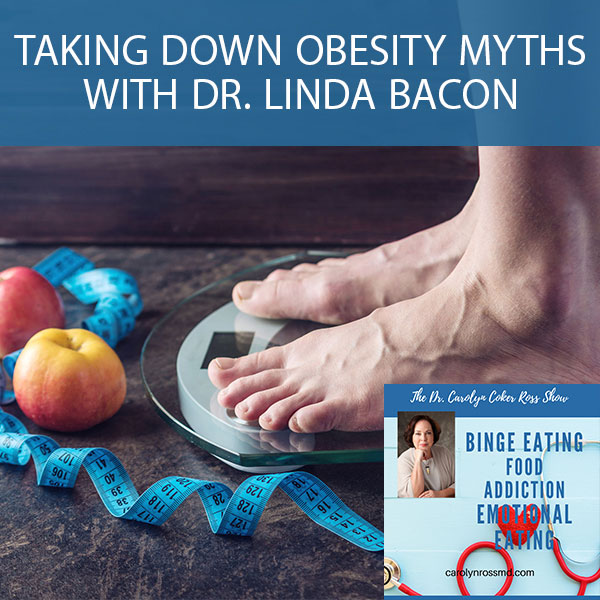
—
Listen to the podcast here:
Taking Down Obesity Myths with Dr. Linda Bacon

Health At Every Size: The Surprising Truth About Your Weight
We’re going to be talking about Health at Every Size, the data against dieting and fatphobia. My special guest is Dr. Linda Bacon. She earned her Doctorate in Physiology specializing in Weight Regulation from the University of California Davis. She also holds graduate degrees in Psychology specializing in Eating Disorders and Body Image and Kinesiology specializing in Exercise Metabolism. She has professional experience as a professor, researcher, psychotherapist, exercise physiologist, and consultant. She is a nutrition professor in the Biology Department at City College of San Francisco and serves as an Associate Nutritionist at the University of California Davis. She’s the author of the book, Health at Every Size: The Surprising Truth About Your Weight. There is a comment on the cover of the book by the New York Times that says, “In the long run, the Health at Every Size approach works better than dieting.” Welcome to the show, Linda.
Thanks, Carolyn.
Can you tell us a little bit about Health at Every Size? I speak all over the country and I never fail to mention the Health at Every Size movement. I’m often surprised that there are still people who haven’t heard of it. Maybe you can give us a little summary?
One thing that people have heard about is the obesity epidemic and it seems like we’re in a cultural climate where everybody is obsessed about weight and the supposing problems that it occurs. The result of this is that people have all kinds of stereotypes and ideas about people who are living in larger bodies. Everybody lives in fear of having a larger body and the fat that they do have on their body. Health at Every Size is based on a very simple premise that if we care about people if we care about health, we need to shift our focus. We need to focus specifically on health, not weight. Certainly, what we know is that much of the information that we say about weight isn’t true. For example, there are plenty of people that are living in fatter bodies that live long disease-free lives despite meeting the medical category of being obese. Similarly, we know that there are plenty of thin people that end up suffering from the diseases that we tend to blame on obesity. The whole idea here is that we can reframe. We can put our attention on supporting everybody and adopting good health behaviors and take the focus off of weight. We can help people to enjoy the bodies that they have and then make good choices to support them.
The Health at Every Size movement has the premise that health is not determined by weight, which is the opposite of the way that the medical community and most of the public looks at it. What has the research shown about that?
It’s interesting to see how the research disputes the common ideas around weight. For example, let’s look at the weight and health issues. We can look at the data around longevity. What we’re finding from almost all of the epidemiologic studies that have been done on weight in longevity is that people in the overweight category live longer than or at least as long as people in the normal weight category. Similarly, people at the level of obesity, most Americans live at least as long as people in the normal weight category. We don’t have any data that shows that fatter people are dying earlier.
Where does that notion come from? Is it made up out of the blue to scare people?
I would imagine that part of it comes from these cultural beauty standards. There’s this idea that everybody’s got to be thinner to be better people in the world. We have a lot of industries that profit off of people hating their bodies and trying to change them. That’s certainly part of it. We’re always looking for scapegoats and people to blame. Other issues that come up is that it is certainly true that it is more common to find disease in heavier people. There’s a natural tendency then to blame it on the weight. When we look at the actual data, what we find is that weight is rarely the primary driver of the disease even in Type 2 diabetes, which is the disease that’s most often blamed on weight. When we look at the data, we find that there’s a much stronger correlation between things like genetics, socioeconomic class, activity levels, eating behaviors, those kinds of things than there is with weight.
[bctt tweet=”Health is not determined by weight.” username=”CarolynCRossMD”]Some people may hear you say eating behaviors and think if someone is obese or overweight, they have poor eating habits. Are you saying that what you eat no matter what you weigh can influence your risk for diabetes?
That’s true and it’s also interesting you’re getting at yet another cultural assumption. I know that everybody does assume that fatter people eat more. We don’t have data to support that. Almost all of the research is showing that fat people eat the same amount as thinner people do. It’s that they’re more genetically predisposed to store it than thinner people are. There’s a combination between genetics and lifestyle that play a role. Two people can eat the exact same amount and one person might end up gaining weight as a result of that, whereas someone else their bodies will instantly burn it off and won’t store it.
I’ve heard many famous speakers say, “Obesity is not rocket science. It’s calories in, calories out and that’s the end of it,” and you’re saying what?
It’s a lot more confusing than that. On the one hand, that is true. That’s the Law of Nature that if you take in more energy than you spend, you’re going to store it on your body and you’re going to gain weight. Here’s where things get confusing is that we don’t have control over the energy balance equation to the degree that many people believe that we do. For example, there are a lot of people that diet to try to lose weight. At the beginning with almost every diet program, what they find is that they usually lose some weight. The same thing is true with exercise. If you try to alter the other side of the energy balance equation and spend more energy, in the beginning, everybody seems to lose weight. What we also know is that there are biologic compensatory mechanisms, where your body tries to fight back after a while. It can slow down your metabolism to balance out what you’re doing. Let’s say you’re dieting, in the beginning maybe you’re going to lose weight. Even if you continue that diet, it may be that your body switches into a conservatory mood where it conserves energy and spends less. Suddenly, eating less might result in gaining weight, not losing weight. There are a lot of myths about how that energy balance equation works. It’s not so simple to think that, “Eat less and exercise more and you should be able to control your weight.” Your body has a lot more power than you do under your own conscious control.
Let me ask you an overall question, is there enough obesity epidemic?

Obesity Myths: Allow our bodies to use its own internal weight meter.
It’s certainly true that people have gained weight since the 1970s. There’s no doubt about that. Things have leveled off though in the last many years. I know that there’s fear-mongering that it’s never going to end and we keep getting fatter and fatter. The increase has certainly ended according to all of the data. I suggest that the larger issue is that this doesn’t seem to be a problem. It seems to be an adaptation to current habits as opposed to a difficulty. I would say however that Americans could probably eat better. They could manage stress in their lives better. They could get more activity. All of these things are going to be beneficial for their health. Many of those things have also changed over the last few decades.
The constant message I keep coming back from is there’s no value in focusing on weight. That’s not the real issue here. We can always support people in developing better habits and that’s going to improve health. It’s important to recognize that despite all the fear-mongering and the change in weight that we’ve seen over the last few decades, Americans are living longer than ever before. We’re getting diseases later in life as well. They don’t seem to be as debilitating as they were before. I know that those ideas are surprising because we keep hearing in the media how we’re getting fatter and it’s killing us. Look at the data and that’s not true.
Why isn’t anyone else looking at the data? What data is everyone else looking at?
I would say that we already have such strong assumptions, that we interpret data with those assumptions in mind. For example, when we see that fatter people are more likely to have diabetes, we automatically blame it on the fatness. We can look at that same data and be open-minded to it and start to tease things out. We recognize then that it’s lifestyle habits that seem to play a larger role.
I know you’re a big proponent of allowing our bodies to use its own internal weight meter. I wondered why you think our current lifestyle makes it hard for us to do that or throws those internal weight meters out of whack?
[bctt tweet=”Your body gives you messages to stop eating when you’ve had enough.” username=”CarolynCRossMD”]Unfortunately, I blame it all on the messages that we’re getting from the experts and the healthcare professionals. We’re told that we can’t trust ourselves. We’re told that we’re supposed to diet and pay attention to our calories and watch what we eat all the time. When we start to do this, we lose touch with all of the natural messages that our body gives us that help us to regulate our weight. This has resulted in weight gain as opposed to people being able to maintain a weight that might be healthy and appropriate for their bodies. I could actually speak to maybe about 100 different studies that have looked at this question, “What happens to people when they try to control their weight?” First off, what we see is that in all the prospective studies that have asked people that have heavy dieted in the last year or so and followed people over time. They consistently find that the people that diet and try to manage their weight are the ones that gain weight over time. Whereas the people that don’t think about it and don’t try do what comes naturally, they’re the ones that stay weight stable over time.
It’s ironic that dieting causes weight gain. We can start to understand the mechanisms behind this. When we look at the data that shows that when people naturally pay attention to hunger and fullness, they have breaks in place. When their body is satisfied and content, they stop eating. For people who try to control their weight and use their brain to stop themselves when they feel they’ve had enough, what we find is that they’re much more vulnerable to all the outside influences. They smell food or see food or something like that. It breaks down their ability to fight. They’re vulnerable to that. They often end up overeating. Whereas someone who is more used to trusting their bodies, they have a natural shut down response where they lose interest in food.
How do you explain the TV show, The Biggest Loser? You take someone who’s 400 pounds and they whipped them into shape by exercising hours and hours a day and dieting and so on? How are those people able to lose their weight?
Almost everything that you do on a short-term basis can result in short-term weight loss. Any time you cut your calories or you exercise more, that’s what’s going to happen. What’s interesting is that they don’t publish the stories of what happens to people years later. We do have plenty of data and in fact, some of these stories are starting to hit the news of people that previously were seen as a success on The Biggest Loser but they’ve regained their weight. The scientific data that has looked at in general what happens to those people over time, they find that the majority of them regain the weight. There are always going to be some individuals that maintain weight loss over the long-term but those are the outliers. That’s not what’s going to happen to most people.
That’s not real world because that’s what we see in the magazines. The stories of so-and-so who kept her weight off for five years. It makes those who are continuing to struggle with losing weight feel like failures on a regular basis.

Obesity Myths: We need to develop a little bit more compassion and acceptance of the diversity of how we are in the world.
We need more balance. More balance would show that depending upon what research study you’re looking at, somewhere between 80% to 95% of the people will regain the weight. I always recommend to people that there’s no reason to try to fight biology. Instead, if you let your body take care of it, if you trust yourself, eat when you’re hungry, you stop when you’re full. Your body will have a natural place that it’s going to settle that’s going to be best for you. For some people, that might result in losing weight because some people might be above a biologically healthy set point. For the majority of people, that’s not going to be the case. What we need to do is we need to take the focus off of weight. Choose these behaviors for the health of it and to feel better about yourself. Your body will take care of things regardless of whether or not you lose weight.
I have two ways in which clients that I work with respond to that message. I have one lady who said she read about there’s no bad food and no good food. She started eating as she said whatever she wants, which generally ended up being a lot of candy, sweets and so on. I have the other side where a client does change their eating behavior and may lose 5% or 10% of their weight. Still is dissatisfied because they aren’t reaching their, “Ideal weight.” How do you respond to these two different reactions?
In that first scenario, what I’d suggest is that this is not about eating with abandon. This is about trusting your body and respecting your body. What you will find is that your body can give you messages to stop eating when you’ve had enough. It’s not about eating endless amounts of food. Your body gives you messages about what are the appropriate foods to eat. If somebody is eating nothing but processed food, they’re probably going to find for example that they’re constipated all the time because they’re not getting any fiber in their diet. They are getting a message from their body that says, “I need something different. This isn’t nourishing for me.” They can learn from that. They can add some fiber. They’ll find that it makes them feel better.
The message is that they’re not listening to their body. They’re indulging themselves.
They’re only indulging the pleasure of the immediate taste. There are a lot of other pleasurable messages that you get from your body. Consistent energy levels throughout the day come through the comfort in bowel movements.
[bctt tweet=”The scale is just a terrible measure of our health and our worthiness in the world.” username=”CarolynCRossMD”]What about the other person who reaches their, “Set point?” Is eating healthily and somewhat more active, has made some positive changes but still can’t get over that number on the scale?
The first point that I’d make is that I know that there’s always that assumption that if somebody is heavy and they adopt better habits that they are going to lose a little weight. I want to suggest that’s not true. What we know is that the biologic mechanisms around weight gain are different from those around weight loss. When people are at heavier weights, even if they reverse all the bad habits they have, it may not necessarily result in weight loss. There’s biologic adaptation where your body might settle in and want to stay at that heavier weight. I want to keep reemphasizing that point. There are going to be plenty of people who are out there that consider themselves to be heavy. They meet the medical definition of obese and are going to adopt healthy habits and will be doing great, but still won’t lose that weight. My recommendation here is that we need to develop a little bit more compassion and acceptance of the diversity of how we are in the world, that fat bodies can be beautiful bodies. You can learn to look at your body. You can see in the mirror whatever you choose to see. It’s not objective.
It’s not a fact that you have to be in those smaller bodies in order to be healthy or be happy or be beautiful. That’s what I think where all of us in this field are battling that assumption. I do a lot of speaking around the country and I often show pictures of celebrities who have been role models for people who are seeking acceptance of their body. Someone like Jennifer Hudson who was portrayed as a sassy role model for those who were overweight. Many of them including Jennifer Hudson are spokespeople for weight loss programs. What do you think about that?
I’m horrified that we look to movie stars as our role models. It could be good healthy behavior or what we should look like. We need to expand our definitions of beauty so that they encompass more and that we encompass ourselves in that. It’s interesting to see how many people have been role models or have parodied their particular weight loss technique. They get all the public eye when they’re losing weight or at their thinner weight and then we forget about them when they regain their weight. Someone like Oprah who’s been public all the time about all of these weight loss methods and she’s lost weight several times, but she keeps bumping back to where she was before. I wish that she would at some point acknowledge that, “Maybe I’m okay the way I am.” I’ve done some damage by telling people at my thinner weight that they too can do this when I can’t maintain it either.
It begs the question of why is it important. Here’s a woman who has a meaningful career. She’s said that herself. She’s one of the richest women in the world and yet it seems that the focus on weight has dominated a great deal of her time and energy.

Obesity Myths: Healthcare professionals often carry very intense bias against fatter people.
It’s sad how superficial it is. I remember her saying that one of the greatest accomplishments in her life was losing weight. That was at the time that she was at a low weight. It was sad to me that she would dismiss all the incredible things that she has done in the world and give that priority. That is sad to me.
You were saying that it might be useful, which I agree, to clarify the terms that we all use to describe weight issues. Can you tell us more about your approach to that?
We’re accustomed to using words like overweight and obese. I try to avoid using these terms. The term overweight, for example, implies that people are over a weight at which they’re healthy. From the scientific literature, we know that this isn’t true. There are plenty of people that are in that category that live long healthy disease-free lives. It’s unnecessarily stigmatizing. It says that there’s something wrong with people, when in fact there isn’t. The same thing is true with the word obesity. It immediately assigns pathology to people living in larger bodies. I try to avoid these terms. The term that I’ve chosen to use instead is fat. The reason I use this term is that there’s a civil rights movement that’s happening where people are trying to reclaim the word fat as just a descriptor. A word stripped from all of its pejorative meaning and describes someone living in a fatter body. It’s a way of saying, “This is who I am. There’s nothing wrong with it.” I more commonly use that but I also know that it’s an uncomfortable word for a lot of people. In this culture, it’s often used as an insult. I know that many people are trying to reclaim it and take it away from that realm. Describe it as a different way of being in the world and an acknowledgment of our diversity.
I love the way you described that. That’s useful. There’s a big HBO four-part series called The Weight Of The Nation. Unfortunately, I haven’t watched all of it yet but I’ve read about it and talked to people who have watched it. I wondered what you thought about this massive production that was underway for the last few years.
Honestly, I haven’t seen the whole thing. I’ve only seen bits and pieces and I’ve read all of their promotion on it. What I’ve seen absolutely horrifies me. In fact, I wrote a blog post in the Huffington Post where I dismissed the series as bread and circus without the bread. Comparing it to a crowd-pleasing Roman spectacle that victimized society’s weakest elements. It scares me looking at this thing to see how it’s going to intensify the already rabid prejudice against fatter people in this country. It seems to play on the same old ideas that fatter people are eating too much, exercising too little and it puts all the blame on them. It doesn’t discuss that the health considerations are also important for thinner people. It gives us the same old remedies, which have been proven not to work. It encourages people to try to diet and to exercise despite the evidence that says that over the long-term basis those aren’t successful. It feels more of the same and none of this stuff is based on good scientific evidence and all it does is it intensifies the stereotype.
[bctt tweet=”Focusing on weight doesn’t make us feel good. There’s no value in it.” username=”CarolynCRossMD”]I was disappointed that they didn’t interview you for that series or someone. I don’t even know if they mentioned Health at Every Size during the series. That’s tragic.
The people defined it as their weight stigma experts but those weight stigma experts it seemed were intensifying the stigma, in my opinion.
I speak to a lot of psychologists, social workers, therapists, physicians and so on. I always talk to them about identifying our own biases on weight because many people aren’t aware that they are biased. They think they’re helping people by promoting this lose weight or exercise or eat less. It’s making the situation worse. Many people that I speak with don’t even realize that they have that bias. Do you see that as well?
I see that very much. In fact, there is scientific research that’s looked at these questions and they find that healthcare professionals often do carry intense biases against fatter people. They’re exposed to the same messaging everybody else is that fat is killing us and that you need to diet and exercise in order to reverse it. They end up parodying the same old ideas. It saddens me that we can’t start to examine these assumptions more.
I want to say your book is fabulous. It’s chockfull of lots of good information and it’s very readable. Even though you do cite the research, you do it in a way that anyone could learn from it. One of the sections you talk specifically about some of the myths in your book. One of them is the myth that everyone can lose weight. Can you say a little bit about that?

Obesity Myths: It’s so hard for anybody to find ways to love their body when we’re always set up with images of bodies that we can never achieve.
It’s important to mention that in my book I always refer to scientific evidence to back up my claims. I’m talking about the same research studies that everybody else in a more conventional obesity world is too. We’re looking at the same research. It’s that you can look at the same data and your assumptions are going to play a role in how you interpret it. It would be easy for people to jump to the conclusion that fat causes disease because you see it more commonly because you see fatter people more commonly having certain diseases like diabetes.
When you look at the research, how do you distinguish?
My challenge to the medical community is that we have to recognize that correlation doesn’t mean cause. Just because It’s more common doesn’t mean that that’s what’s causing it. We have to ask more questions about the data. That’s the problem is that they go in there with assumptions and they automatically translate things in light of their assumptions. That’s why we keep saying the same things over and over again. That’s why it’s important that we start to challenge the paradigm.
Let’s talk about the myth that everyone can lose weight.
It’s been tested. There have been many research studies that have followed people over the long run, both diet studies and exercise studies. For example with an exercise study, they have people that are coming into a laboratory and working out on a treadmill. The scientists know that they’re doing the exercise program that’s prescribed. What they find is that in the beginning people lose weight, but then they regain the weight that they lost. We have a lot of scientific evidence that shows that over the long run it doesn’t work. For some reason, we publish thousands of studies that only look at that short-term period where they do lose weight. We don’t carry out that many studies that are long-term, yet we do have some of those long-term studies. Yet we don’t pay attention to them and bring them to the forefront. It’s ignoring data that’s there.
[bctt tweet=”If we all can just see ourselves as amazing, we will be nicer to ourselves.” username=”CarolynCRossMD”]There is a huge part of the Women’s Health Initiative study for example that you cite in your book of 20,000 women who were placed on a low-fat diet. What did that study show specifically?
It was at the time the largest diet study that was ever done by the US government and it was a randomized controlled study, which is considered to be the gold standard in research. What they found was the same thing we find everywhere else that people lost weight initially. When they looked at the women eight years later, they on average had regained all of the weight despite the fact that they were maintaining their diet. They were all eating less than when they had started the study. This wasn’t a radical diet. This was the moderate kind of drop your calories a little. They dropped their calories about 300 or 350 kilocalories a day. It wasn’t anything extreme. That study proved that on the long-term it doesn’t work. Yet it’s not something that they ever brought to the forefront when they publish their results.
Are there any other myths that you see commonly that we haven’t touched on? We talked about you can’t trust the experts. We also talked about the control your weight myth.
One of the things that you had commented on was that you like the imagery of my book. On the cover of my book, I’ve got a scale in a trash can. That’s the ultimate conclusion that we need to come to. The scale is a terrible measure of our health and our worthiness in the world. It gets in the way of people being able to make good choices. What often happens to people is that they start off their day weighing themselves and they usually don’t like what they see. As a result, they feel bad about their bodies. If you feel bad about your body, you’re not going to make good choices to support it. In my house, I do have a scale that I often weigh myself on in the morning. It’s a scale that was made by activist, Marilyn Wann. What she did was she took the numbers out and replaced everything with compliments. When I stand on the scale or when I sit on the scale, it told me I was gorgeous. It makes me feel good. If I have a gorgeous body, I’m going to take better care of it when I feel good about it. That’s one of the most important messages that we all need is that this focus on weight doesn’t make us feel good and there’s no value in it. On the other hand, if we all can see ourselves as amazing, we’ll be nicer to ourselves.
The other thing the focus on weight does is it’s such an energy drain. Often as my female patients say, who are the biggest dieters in the country and the world, “What could you do with that extra time that you spend worrying about your weight, focusing on the number on the scale?” It takes up much energy and takes away from all of the other wonderful things that life has to offer. You said in your book that not only are we what we eat, but we’re also what our mothers ate. Can you say a little more about that?
It goes back way before our mothers, to look at earlier ancestors as well. From an evolutionary perspective, there have been many times throughout history where we’ve had famines. When people didn’t get enough calories to eat, they couldn’t survive and they would die. Over time, people’s bodies adapted. What they learned to do is to be able to store fat that during these famines when there wasn’t as much food available, they can then survive off of the energy that’s in stored body fat. What we’re finding now is that when people diet, your body doesn’t know the difference between diet and a famine. All it knows is it’s not getting enough calories. It seems to trigger your body to want to store more fat in the future to protect against the future diet. I expect that part of the contribution to why people are heavier now than they used to be is because we’re dieting more. It’s triggered all of these mechanisms where people store more weight. To get more directly to your question, we’ve also seen research that documents that when women diet when they’re pregnant, their kids when they grow to adulthood are more likely to be heavier. We think that part of what happens is it sets up this developing fetus, that the fetus becomes efficient at being able to store fat to protect itself against calorie deprivation. That would explain why they’re fatter in adulthood.
That brings up the whole issue of childhood obesity and the ways in which we’re going about dealing with that. Do you have any comments about it?
Teens are tough on one another and it’s hard for anybody to find ways to love their body when we’re always set up with all these images of bodies that we could never achieve. We would benefit much more by helping kids to appreciate their bodies. I know I sound like a broken record, but then they make better choices to take care of them. What we know is that thin kids need to develop good eating and exercise habits well. It doesn’t do any good for us to only target the fat kids in our health promotion campaigns. It makes them feel bad about their bodies, sets them up to be more victims of bullying. It doesn’t help the thinner kids develop better habits. I remember speaking with a teenager and she was talking about how painful it is to walk down the halls and to see these obesity prevention signs all over the place. She says, “Have they ever thought about what it means to me to think they don’t want anybody to look like me? That’s what they’re saying in their message. Do they start to think about how that’s going to make me feel?” The other point she made was, “My friends and I eat lunch together all the time and we’re eating the same thing, but they never get the message that they’re supposed to pay attention to this or that it matters for their health in any way. Yet all the burden is on me.” What she was saying is, “I do eat fairly nutritiously, but it doesn’t seem to result in me losing weight. I wish that people can see that instead of having the assumption that I’m eating poorly all the time.”
It breaks your heart to see what’s happening in this arena because children are being stigmatized and that’s a stigma as you know. In our field of treating eating disorders, that can last a lifetime. It’s hard to see that we’ve gone in that direction. It’s unethical. You write that the usual approach of focusing on weight is damaging and unethical. Yet the majority of healthcare professionals and public policy people have this focus on encouraging what’s called a healthy way. Do you have a suggestion for a more helpful direction?
We need to demand of the healthcare profession that it switch back to evidence-based medicine. What’s going on is intolerable. That the government recommendations we get all the time are doing more fear mongering and causing more disease rather than helping. It’s time that we hold our healthcare industry responsible and demands that they practice good evidence. I don’t think the burden should be on me anymore to have to prove that things don’t work. If they’re going to be practicing this medicine, they need to prove that either it works or confront the fact which inevitably they will have to if they try to find the evidence-based. That what they’re doing has caused much more damage than has been helpful.
That’s what I say when I show the pictures from the Behavior Risk Factor Survey of the increasing levels of obesity over the past 50 years. My conclusion is what we’re doing is not working. I love what you say in your book when you talk about what to do about the war on obesity. You say, “Refuse to fight in an unjust war. Join the Peace Movement, the Health at Every Size movement.”
I’m thrilled to see that the Health at Every Size Movement has been growing exponentially. In fact, there is now a professional organization for most healthcare professionals but it spans all professions right now called ASDAH, the Association For Size Diversity And Health. It has a large membership and there are people working in diverse fields trying to change the paradigm. We also have a community website called the HAES Community Resources. People can go and register their support for free to show how big the movement is. There are probably about 5,000 people or so that have pledged their support. The other great thing about it is that people who are working in the field can register their data so others can find them. There’s a free searchable database, so if you’re looking for anyone in a profession or in a field that practices from this perspective, you can connect with them there.
I want to make sure that I read a quote from your book that was written by one of the participants in the Health at Every Size research study. I feel it exemplifies what you and I and many of us are trying to promote. This patient or client says, “I came to the program looking to make less of myself to lose weight. I left proudly taking up more space, feeling lighter and less restricted in my body. I came to the program looking for rules about what to eat or avoid and how to control my urges. I left trusting myself, confident that I am more competent than any outside expert in knowing how best to feed myself. Food, previously a trigger for shame, guilt and fear is now a source of great pleasure. Most importantly, I know that everything I want in life is available to me now, not twenty pounds from now, which has given me a tremendous sense of freedom to explore what’s important to me.” That sums up what your work has been about and certainly what mine has been about. I want to thank you so much, Linda, for being on the show. Thank you again for coming and talking about Health at Every Size.
It was a delight to talk to you, Carolyn. Thank you for inviting me.
I’ll talk to you soon. Until then, I wish you good health and vitality.
Important Links:
- Health at Every Size
- Health at Every Size: The Surprising Truth About Your Weight
- Women’s Health Initiative
- Marilyn Wann
- Association for Size Diversity And Health
- HAES Community Resources
About Dr. Linda Bacon, PhD
 Dr. Linda Bacon is fostering a global transformation to a more just world, where all bodies are valued, respected, and supported in compassionate self-care. Best known for her paradigm-shifting research and advocacy upending the weight discourse, Bacon’s inspiring message takes us beyond size, to shaping a culture of empathy, equity, and true belonging. She’s currently writing her next manifesto, provisionally titled When Self-Love Isn’t Enough: Cultivating Body Liberation in an Unjust World while spreading this message through public speaking.
Dr. Linda Bacon is fostering a global transformation to a more just world, where all bodies are valued, respected, and supported in compassionate self-care. Best known for her paradigm-shifting research and advocacy upending the weight discourse, Bacon’s inspiring message takes us beyond size, to shaping a culture of empathy, equity, and true belonging. She’s currently writing her next manifesto, provisionally titled When Self-Love Isn’t Enough: Cultivating Body Liberation in an Unjust World while spreading this message through public speaking.
A professor and researcher, for almost two decades Dr. Bacon has taught courses in social justice, health, weight, and nutrition; she has also conducted federally funded studies on health and weight and published in top scientific journals. Her research has been supported by grants from the United States Department of Agriculture and the National Institutes of Health.
Bacon earned her PhD in physiology from the University of California, Davis, where she currently serves as an Associate Nutritionist. She holds additional graduate degrees in psychology and exercise metabolism. She formerly taught at City College of San Francisco, in the Health Education, Psychology, Women’s Studies, and Biology Departments.
Dr. Bacon has mined her deep academic proficiency, her wide-ranging clinical expertise, and her own personal experience to write two best-selling books, Health at Every Size: The Surprising Truth About Your Weight, and the co-authored Body Respect: What Conventional Health Books Get Wrong, Leave Out, or Just Plain Fail to Understand about Weight, both of which are credited with transforming the weight discourse and inspiring a hopeful new course for the global body positivity movement.
Well-respected for her provocative social and political commentary, Dr. Bacon’s advocacy for body respect has generated a large following on social media platforms like Facebook and Twitter, health and nutrition listservs and specialty blogs, and the international lecture circuit. She is committed to centralizing the ways in which power, privilege, and disadvantage complicate our experience of our bodies.
With a rare dual perspective combining academic expertise and clinical experience, Bacon is adept at providing a link between scientific research and practical application. This enables her to bring authority and compassion to her writing, speaking and teaching. Her personal difficulties with weight regulation and body dysmorphia and experience in overcoming them provide important perspective and inspiration for her work. She specializes in translating science into practical, actionable terms.
Health professionals – as well as people on their own personal journeys to body appreciation – call Linda’s work “life-changing” and “transformative,” providing the tools and confidence for personal change and inspiring others. A compelling speaker, writer and storyteller, Dr. Bacon delivers a unique blend of academic expertise, clinical experience, and social justice advocacy, all couched in a raw honesty and compassion that touch and inspire.
Oh, and she prefers if people use her nickname, “Lindo”. More on that in her next book, or if you catch her in person.
Bacon is industry-independent. Her pledge not to accept money from the weight loss, pharmaceutical or food industry, signed when getting her PhD almost two decades ago, supports her in speaking truth to power.








